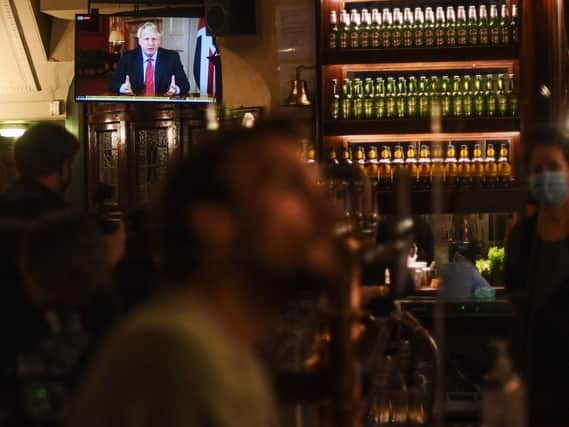'We might not like the new Covid-19 restrictions...but the evidence is there, we have to comply'


It was always possible - even likely to happen - and after Monday’s expert preparation of the nation by Professor Chris Whitty and Sir Patrick Vallance, the government has now unveiled new rules and conditions for how we live our lives as the coronavirus pandemic rolls on.
But will they finally be enough?
I was interested to hear Chris Whitty say – even as a casual aside – that it is science which will ride in to save us.
Advertisement
Hide AdAdvertisement
Hide AdAs a survivor of Covid-19 himself he might well live to see the truth of this, but nobody knows under what timescale, optimistic or otherwise.
We’re told that vaccine development is moving on apace – that’s great news, but even with fast track testing and licensing for use there’s going to be global demand for production and immunisation, all of which takes time to service.
There will be issues over who gets the vaccine first, prompting, in turn, not only a commercial competition the likes of which we’ve never seen, but also backed or possibly hindered by certain politicians in certain countries demanding that their nations get their hands on stocks before anyone else can.
And in the meantime, cases of coronavirus will continue to develop – with, in certain cases, tragic results.
Advertisement
Hide AdAdvertisement
Hide AdSocial historians will be able to look back and chart the way in which we grappled with the issues of Covid-19, from our initial response to the economic and social aftermath of the same.
In an age of instant and speculative news reporting, Covid-19 has been every bit the headline as was the war in Afghanistan, AIDS or either of the Gulf Wars.
The effects of it are likely to be more profound than all combined together when you consider employment, the cost to business, mistakes made along the way and the strategic planning – or absence of it – which, in turn, prompted more mistakes.
What will we learn about ourselves? It’s not as though it’s never happened before, either.
Advertisement
Hide AdAdvertisement
Hide AdWhat do we still have coming our way, from which we will have to learn?
Perhaps the greatest challenge of all is how to get ahead of Covid-19.
The impression that I have formed, rightly or wrongly, is that the world has continuously acted after the event, rather than being able to plough any kind of firebreak which puts us ahead of the disease.
The restrictions which we are having to deal with right now are the response to what has already been developing for weeks.
Advertisement
Hide AdAdvertisement
Hide AdJust as people started to say that the pandemic was receding, back it came and now we are again reacting.
I have no political axe to grind – the disease recognises no demarcation between who’s in charge and who isn’t either.
Now is the time for more of what we’ve experienced before – but, in turn, we absolutely have to get ahead of the game or risk being overwhelmed by it.
Do we have to look at this on some kind of a war footing? Perhaps - because the NHS is again going to be on the frontline.
Advertisement
Hide AdAdvertisement
Hide AdChris Whitty said on Monday that treatment for coronavirus is much improved – he also said that we now have a six month period of shorter, colder, damper days ahead.
That’s no politician talking – that’s the science.
We might not like it – but the evidence is there to see.
We have to comply, do the responsible things - and maybe ride this out.